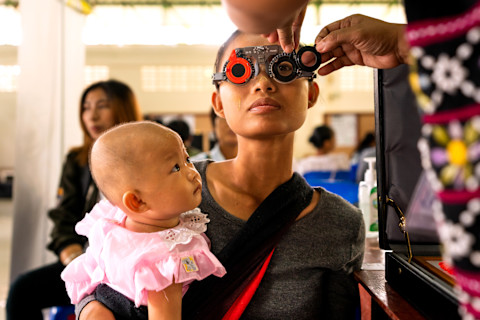6 Daily Habits That Are Probably Affecting Your Eyesight, According To An Optometrist

You track your steps, practice yoga, and maybe even get acupuncture—do you remember the last time you got your eyes checked?
Even if you don't feel like you have a vision issue, experts recommend getting a comprehensive eye exam annually. It's much more than a steppingstone on the way to a new pair of glasses or contact lenses—it's a commitment to your overall health.
"A fair amount of people don't know the importance of an eye doctor, or what a comprehensive eye exam actually does," says Weslie M. Hamada, O.D., an optometrist at LensCrafters. "It's really about prevention and care throughout your lifetime, just like you'd go to your primary care physician for a checkup. Even if nothing hurts, that doesn't mean there's not something going on."

Eye exams can reveal way more than our vision Rx.
When you think about it, "the eyes are the only organ in your body where we can see damage to blood vessels, swelling, and inflammation without actually having to do an invasive procedure," Hamada says. "So during eye exams, we're looking at the retina—the back of the eye—where we can detect damage to blood vessels that can be an indication of systemic diseases like high blood pressure, high cholesterol, diabetes, potential tumors, and other conditions before the individual even knows about it."
Beyond health issues, clear vision helps us with more than how we see—it helps us connect with one another and focus on our work, which is especially important for kids in school. "Lots of times a parent will come in when their child has failed a screening at school or is diagnosed with attention deficit issues," says Hamada, "and getting fitted with their first pair of glasses was the kicker. Kids don't know what they should be seeing, so it's important to bring them in for their first exam when they start school or even preschool. If they can't see the board, why are they going to pay attention?"
We only have two eyes, and we can’t replace our vision.
Turns out, 2.5 billion people in the world need glasses, and 1.1 billion of those people can't fill that need either because of affordability or access to care where they live. An independent nonprofit called OneSight is closing this vision care gap by providing eye exams and glasses to over 23 million people since it launched over 30 years ago.

"Thanks to impactful partnerships with brands like LensCrafters, OneSight is able to scale its efforts and initiatives to reach more people—not just in countries around the world but in our own backyard," says president and executive director K-T Overbey. "OneSight has evolved from a local effort to help schoolchildren to now serving over 50 countries, and in some, establishing permanent vision care centers where locals learn how to provide the services, so the solution becomes economically sustainable," she says.
This World Sight Day on October 10, visit onesight.org to see how you can get involved locally.
Take care of your eyesight by being mindful of these everyday habits:
1. Staring at screens.
This isn't just for the nine-to-fivers working on laptops all day—if you're binge-watching a TV show or reading a book on an electronic device, listen up: "When we blink, our eyelids spread tears over our eyes, keeping them moisturized. But when we're staring at something, we decrease our blink rate, which causes the eyes to get dry and fatigued over time," explains Hamada.
Use the 20/20/20 rule: Every 20 minutes, look off about 20 feet in the distance for 20 seconds or more to give your eyes (and yourself) a healthy break.
2. Wearing the wrong sunglasses.
Hamada points out that a lot of sunnies out there don't have the UVA/UVB blocker that's necessary to help reduce damage caused by the sun. Look for sunglasses that protect your eyes from both UVA and UVB rays (and while you're at it, wear a hat and sunscreen for that always-on protection).
3. Overusing your contacts (and not cleaning the contacts case!).
Think stretching out the wear of your contacts is harmless as long as you're cleaning them? "Your eyes have a lot of bacteria in them, and since lenses are developed to be worn for a certain amount of time, not abiding by the wear schedule can increase the chance of infection," says Hamada.
On that note, Hamada adds, "You should really be replacing your lens case every three months or when your bottle of solution runs out. If you think about commonly where you keep your case—your bathroom—you have a toilet with bacteria floating around, so make sure you're rinsing your case properly and not just topping off the solution. Dump out the solution in the morning; rinse the case out with solution; let it air dry in the medicine cabinet."
4. Not eating enough nutrients and vitamins for eye health.

Since your eyes are organs, anything you put in your body can either help or harm them (smoking, of course, is an obvious example). A diet that increases your risk or high blood pressure, cholesterol, and diabetes all affect your eyes too, according to Hamada.
To keep your peepers healthy, Hamada suggests getting some key vitamins and nutrients: "Vitamins A, C, E, and B12 help combat free radicals and help protect the retina. Lutein in leafy greens also protects the retina. And anti-inflammatories like clean fish oil has also been proven to reduce dry eye in some individuals," she says.
5. Sleeping with makeup on.
You don't need us to tell you this one, but here's why it's a problem: "When eye makeup like mascara gets into the cornea—the front part of the eye—that increases the chances of getting a corneal infection or a scratch," says Hamada.
6. Skipping your eye exams.
When it comes to the health of your eyes over your lifetime, this is a must. Simply put, "As we get older, like everything else, our eyes age," says Hamada. Many of vision's aging processes like cataracts or dry eyes can be diagnosed and treated without affecting vision and quality of life over time," she says. "Nothing against the dentists, but we can get false teeth—we only have two eyes, and we can't replace our vision."
For more information about eye health and vision care, visit lenscrafters.com.
